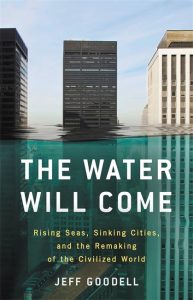Book Review: The Water Will Come
/The Water Will Come: Rising Seas, Sinking Cities, and the Remaking of Civilizationby Jeff GoodellLittle, Brown, 2017In the geologically immediate wake of the last ice age, writes Jeff Goodell in his incredibly sobering new book The Water Will Come: Rising Seas, Sinking Cities, and the Remaking of Civilization, indications are that sea levels rose thirteen feet in a single century. Considering how many hundreds of millions of humans, how much farmland, and how many major cities around the world currently exist solely because the oceans are not thirteen feet higher, it doesn't require much imagination to see how catastrophically such a change would alter human civilization in the 21st century. But even readers without that modicum of imagination need not worry: in these pages, Goodell leaves absolutely nothing to speculation or fancy. In clear, spare, driving prose, he probes every scenario, every large and small ramification of the ecological calamity currently underway on poor beleaguered planet Earth. This is not a prescription for better living before it's too late; this is a post-mortem on humanity, stamped diagonally “It's Too Late.”A great deal of the problem, as Goodell writes, is simple momentum. Once the planet's ice sheets begin a feedback loop of rapid melting, the process essentially closes itself off from remedy. Likewise the skyrocketing concentration of greenhouse gases in the planet's atmosphere; even the promptest and steepest action taken in 2017 is likely decades too late:
Rising Seas, Sinking Cities, and the Remaking of Civilizationby Jeff GoodellLittle, Brown, 2017In the geologically immediate wake of the last ice age, writes Jeff Goodell in his incredibly sobering new book The Water Will Come: Rising Seas, Sinking Cities, and the Remaking of Civilization, indications are that sea levels rose thirteen feet in a single century. Considering how many hundreds of millions of humans, how much farmland, and how many major cities around the world currently exist solely because the oceans are not thirteen feet higher, it doesn't require much imagination to see how catastrophically such a change would alter human civilization in the 21st century. But even readers without that modicum of imagination need not worry: in these pages, Goodell leaves absolutely nothing to speculation or fancy. In clear, spare, driving prose, he probes every scenario, every large and small ramification of the ecological calamity currently underway on poor beleaguered planet Earth. This is not a prescription for better living before it's too late; this is a post-mortem on humanity, stamped diagonally “It's Too Late.”A great deal of the problem, as Goodell writes, is simple momentum. Once the planet's ice sheets begin a feedback loop of rapid melting, the process essentially closes itself off from remedy. Likewise the skyrocketing concentration of greenhouse gases in the planet's atmosphere; even the promptest and steepest action taken in 2017 is likely decades too late:
The best way to save coastal cities is to quit burning fossil fuels (if you're still questioning the link between human activity and climate change, you're reading the wrong book). But even if we ban coal, gas, and oil tomorrow, we won't be able to turn down the Earth's thermostat immediately. For one thing, carbon dioxide is not like other kinds of air pollution, such as the chemicals that cause smog, which go away as soon as you stop dumping them into the sky (as happened, by and large, when catalytic converters were installed on cars). A good fraction of the [carbon dioxide] emitted today will stay in the atmosphere for thousands of years.
There are actions that can be taken, of course. There are mitigating measures at all levels of expenditure, and there's the much-ballyhoo'd infinity of humanity's inventiveness in times of crisis. Global economic damages could reach hundreds of trillions of dollars by the end of the century if such measures aren't adopted quickly and on wide scales, but as Goodell poignantly observes, much more than money will be lost:
But it is not just the money that will be lost. Also gone will be the beach where you first kissed your boyfriend; the mangrove forests in Bangladesh where Bengali tigers thrive; the crocodile nests in Florida Bay; Facebook headquarters in Silicon Valley; St. Mark's Basilica in Venice; Fort Sumter in Charleston, South Carolina; America's biggest naval base in Norfolk, Virginia; NASA's Kennedy Space Center; graves on the Isle of the Dead in Tasmania; the slums of Jakarta, Indonesia; entire nations like the Maldives and the Marshall Islands; and, in the not-so-distant future, Mar-a-Largo, the summer White House of President Donal Trump. Globally, about 145 million people live three feet or less above the current sea level.
The controlled bitterness of the Trump mention surfaces a few times in the book, as how could it not, when the current US President denies that global warming is even happening, has appointed similar science-deniers to positions of key authority in US environmental policy-making, and has signaled US withdrawal from even the tentative first-step climate accords enacted by the international community? The picture painted by The Water Will Come is horrifying enough even with all the world's leaders and nations pulling together to save their only home; with the world's foremost leader and nation actively pushing in the opposite direction, fighting for the status quo while the floor burns beneath their feet, Goodell's book becomes a thing of almost twisted irony. Somewhere very near to where you're reading this, vital farmland sits at sea level, a major city thrives by the shore, or a vast electrical sub-station (or, God forbid, a nuclear power plant) is built on a flood plain. And the water will come.
